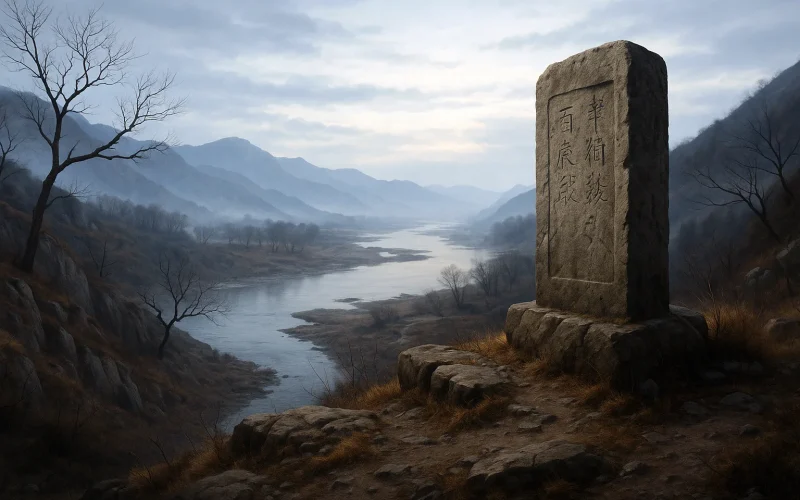South go the wildgesse, for leaves are now falling,
And the water is cold with a wind from the north.
I remember my home; but the Xiang River's curves
Are walled by the clouds of this southern country.
I go forward. I weep till my tears are spent.
I see a sail in the far sky.
Where is the ferry? Will somebody tell me?
It's growing rough. It's growing dark.
Original Poem
「早寒江上有怀」
孟浩然
木落雁南渡, 北风江上寒。
我家襄水曲, 遥隔楚云端。
乡泪客中尽, 孤帆天际看。
迷津欲有问, 平海夕漫漫。
Interpretation
Composed during Meng Haoran's travels in Jiangnan, this work reflects the poet's sojourn in unfamiliar lands amidst career disappointments, filled with homesickness and existential uncertainty. The title "Early Cold" references both the seasonal transition and emotional state. Through wintry river scenery, the poem conveys profound loneliness and nostalgia, exemplifying Meng's signature fusion of landscape and emotion in his travel poetry. The melancholic autumn imagery perfectly embodies the wanderer's sorrow, making this one of his most representative journey poems.
First Couplet: "木落雁南渡,北风江上寒。"
Mù luò yàn nán dù, běi fēng jiāng shàng hán.
"Leaves fall, wild geese southward fly; Northern winds chill the river's sigh."
This classic autumn tableau establishes the poem's melancholic atmosphere. Bare trees, migrating geese and biting winds create a desolate riverscape, foreshadowing the traveler's solitude.
Second Couplet: "我家襄水曲,遥隔楚云端。"
Wǒ jiā Xiāng shuǐ qū, yáo gé Chǔ yún duān.
"My home curves by Xiang River's bend, Veiled beyond Chu's cloud-wrapped end."
The poet locates his hometown (Xiangyang) through geographical distance rather than explicit longing. The "cloud-wrapped" imagery embodies emotional separation through physical barriers.
Third Couplet: "乡泪客中尽,孤帆天际看。"
Xiāng lèi kè zhōng jìn, gū fān tiānjì kàn.
"A wanderer's tears long dried away, Yet still I watch that lone sail's sway."
Emotional climax: the exile's tears exhaust themselves, leaving only the silent gaze toward a distant sail—both literal view and metaphor for rootless existence against life's vastness.
Fourth Couplet: "迷津欲有问,平海夕漫漫。"
Mí jīn yù yǒu wèn, píng hǎi xī màn màn.
"Lost at the crossing—none to ask, The river-sea drowns in twilight's mask."
The conclusion transforms scenery into existential metaphor: the boundless evening waters mirror the poet's disorientation in both travel and life's uncertain path.
Holistic Appreciation
Centered on "cold" and "longing," the poem progresses from scenery to emotion to metaphysical contemplation. Autumnal imagery—fallen leaves, solitary sails, the goose-gray river—weaves physical journey with psychological exile. The closing line merges human transience with cosmic infinity, achieving sublime resonance where personal displacement becomes universal condition.
Artistic Merits
The work exemplifies Meng's genius for emotional restraint and symbolic depth. It begins with seasonal cues ("early cold"), develops through implied nostalgia ("cloud-wrapped"), and resolves into existential metaphor ("river-sea"). The tonal shift—from observed scenery to internalized melancholy—demonstrates his mastery of 情景交融 (emotion-scene fusion).
Insights
This poem articulates the universal migrant experience: seasonal shifts magnify our vulnerability, and alien landscapes amplify yearning for belonging. Meng's wintry river becomes a mirror for modern readers—reminding us that however far we roam, the dual pull of native roots and life's unanswered questions remains inescapable.
Poem translator
Kiang Kanghu
About the poet

Meng Haoran (孟浩然), 689 - 740 AD, a native of Xiangyang, Hubei, was a famous poet of the Sheng Tang Dynasty. With the exception of one trip to the north when he was in his forties, when he was seeking fame in Chang'an and Luoyang, he spent most of his life in seclusion in his hometown of Lumenshan or roaming around.












